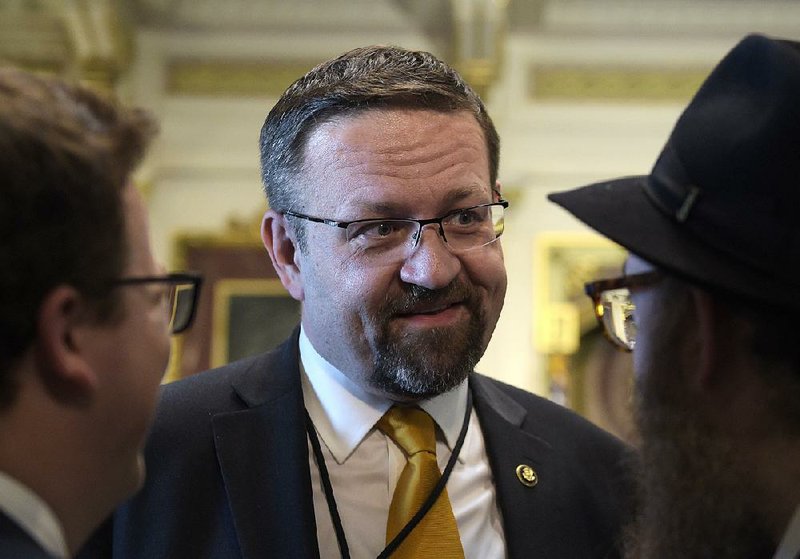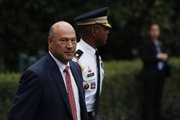NASHVILLE, Tenn. -- The Republican National Committee walked the tightrope Friday in denouncing white supremacist groups without criticizing President Donald Trump, who waffled in his own statements in the days after violence this month in Virginia.
Meeting in Nashville, Tenn., the national committee approved a raft of resolutions, including one asserting that "Nazis, the KKK, white supremacists and others are repulsive, evil and have no fruitful place in the United States."
And while the vote was unanimous, some members grumbled that the resolution was unnecessary and reflected unnecessary defensiveness.
"It's amazing that we have been lured into this argument that we're not racists. It's absurd," said Colorado Republican Chairman Jeff Hays. "Why would we feel compelled to do that?"
The sentiment reflects a difference between committee leaders concerned about the party's image in light of Trump's latest rhetorical thicket and newer, more ardently pro-Trump state Republican leaders who say such a statement appears defensive.
But the resolution was a priority for Chairman Ronna Romney McDaniel, as well as for committee members who were openly bothered by Trump's initial resistance to singling out the racist groups after the Charlottesville violence.
Hearing about the grumbling, McDaniel made the rounds Friday morning to reiterate to members that the measure was a priority.
"Every day, I wake up proud that we're the party of Lincoln," McDaniel told the committee Friday. "Condemning violence is not a Republican or Democratic issue. It is an American issue."
Bill Palatucci, a committeeman from New Jersey who sponsored the resolution, said it was important for the committee to formally denounce white supremacists.
Palatucci said, "I think he got it wrong a week ago Tuesday, in regards to Charlottesville," when Trump said during a news conference that there were "very fine people on both sides" at the demonstration.
Despite the resolution, there didn't appear to be a softening of support for the president within the party's national organization.
Rather, the gathering seemed to spark renewed backing for the president despite a series of recent setbacks: the GOP's failure to repeal and replace the Patient Protection and Affordable Care Act; the backlash over his comments about the white supremacist rally in Charlottesville; and the departure of Reince Priebus, the committee's former chairman, as Trump's chief of staff.
"The president was not wrong to point out what the media has failed to point out," that counterprotesters also "came for a battle" in Charlottesville, said Pennsylvania Republican Chairman Val DiGiorgio.
DiGiorgio stood by the "many sides" comment Trump made immediately after the clash in Virginia, in which a car was driven into a crowd of counterprotesters, killing a woman. The president was criticized harshly by both Republicans and Democrats because he didn't immediately denounce the white nationalist groups.
There was palpable contempt in the conference room for counterprotesters who some said were ready to fight.
Committee member Morton Blackwell, who affirmed his support for the resolution, said, "Every person who came to Charlottesville intending violence was evil."
But even Palatucci, who backed the resolution and was a devout supporter of New Jersey Gov. Chris Christie's 2016 presidential campaign, said, "I support the president's agenda." He cited deregulation measures Trump has signed and the president's plan, outlined Monday, to send additional U.S. troops to Afghanistan to revive the effort to root out terrorist cells.
The party's robust $87 million raised to date -- dwarfing what Democrats have raised -- has also lifted spirits, as has improving economic confidence.
TRUMP ASSAILS CORKER
The consensus in Nashville was that the Republican-controlled Congress, not Trump, has let down the party.
"There is a level of frustration that Congress didn't repeal and replace Obamacare," Ohio Republican Party Chairman Jane Timken said. "They want the president's agenda passed. They blame Congress."
Trump has complained about Senate Majority Leader Mitch McConnell -- mostly before and since the failed health care vote in July -- and other Republican senators who have criticized the president or opposed his efforts. He notably pointed to Sens. John McCain and Jeff Flake, Arizona Republicans, during a speech to supporters in Phoenix on Tuesday.
On Friday morning, he attacked another fellow Republican, Sen. Bob Corker, R-Tenn.
Corker, chairman of the Senate Foreign Relations Committee, last week publicly questioned the president's stability and competence. The president's early-morning tweet appeared to suggest that Corker was in political trouble in his home state.
"Strange statement by Bob Corker considering that he is constantly asking me whether or not he should run again in '18. Tennessee not happy!" Trump wrote.
It was not immediately clear what conversation Trump was referring to, or what provoked him to attack Corker more than a week after the senator said the president "has not yet been able to demonstrate the stability, nor some of the competence that he needs to demonstrate in order to be successful."
But Sarah Huckabee Sanders, the White House press secretary, was asked about Corker at her news briefing Thursday, and those clips were mentioned on some Friday morning television newscasts that the president is known to regularly watch.
Despite Trump's feud with McConnell, there was little talk in Nashville of dumping the veteran Kentucky senator as leader.
"I'm not ready to abandon McConnell," DiGiorgio said. "But I would urge him to come together and get this done."
Trump's intraparty attacks have some GOP strategists worried that the fighting could harm Republicans' chances of holding the Senate in next year's midterm elections, though that would require Democrats to retain almost all of the 10 seats they occupy in states Trump won last year.
McDaniel said Trump's taunts are the outspoken New Yorker's way of urging action.
"The president wants to see his agenda passed," McDaniel said. "He's channeling what I'm hearing from the American people, which is, 'We gave you the White House. You have the Senate. You have the House. Why aren't you getting these things done?'"
GORKA OUT AS AIDE
Late Friday, White House national security aide Sebastian Gorka said he had resigned from his position.
A White House official, however, said Gorka did not resign but "no longer works at the White House." The official was not authorized to discuss the matter publicly and spoke on condition of anonymity.
Gorka, 46, declined to discuss the reasons he left the White House, but pointed to excerpts from his resignation letter that were posted Friday evening by The Federalist website.
Gorka wrote that "the individuals who most embodied and represented the policies that will 'Make America Great Again,' have been internally countered, systematically removed, or undermined in recent months."
His departure came a week after the exit of chief strategist Steve Bannon. Gorka is a former editor at Breitbart News, a rightist website with which Bannon has long been affiliated. After leaving the White House, Bannon returned to the media company as executive chairman.
Gorka had been a vocal defender of the Trump administration's efforts to temporarily ban travel from some predominantly Muslim countries; he has said violence is a fundamental part of Islam and emanates from the language of the Koran. His hard-line views on Islam have prompted his critics to accuse him of Islamophobia.
Gorka, 46, has also been accused of having links to far-right groups in Europe.
Separately, Gary Cohn, a prominent Jewish member of the Trump administration, said Thursday that the White House "can and must do better" in consistently condemning hate groups.
Cohn, Trump's top economic adviser, seriously considered resigning and even drafted a letter of resignation, two people familiar with the draft told The New York Times.
In his first public remarks on the national dialogue about the violence, Cohn said in an interview Thursday with the Financial Times that as a "patriotic American" he did not want to leave his job as the director of the National Economic Council.
"But I also feel compelled to voice my distress over the events of the last two weeks," Cohn said.
In the days after the Charlottesville rally, when Trump defended white nationalist protesters, Jewish members of the administration were mostly silent. Cohn is one of the few in the administration to publicly condemn the president's remarks.
"Citizens standing up for equality and freedom can never be equated with white supremacists, neo-Nazis, and the KKK," Cohn said in the Thursday interview. "I believe this administration can and must do better in consistently and unequivocally condemning these groups and do everything we can to heal the deep divisions that exist in our communities."
Cohn added, "As a Jewish American, I will not allow neo-Nazis ranting 'Jews will not replace us' to cause this Jew to leave his job."
Information for this article was contributed by Thomas Beaumont of The Associated Press; by Maggie Haberman, Thomas Kaplan, Matt Stevens and Kate Kelly of The New York Times; and by Philip Rucker of The Washington Post.
Click here for larger versions
Photos by The Associated Press
Photos by The Associated Press
RELATED ARTICLE
http://www.arkansas…">California rightist rallies canceled
A Section on 08/26/2017


